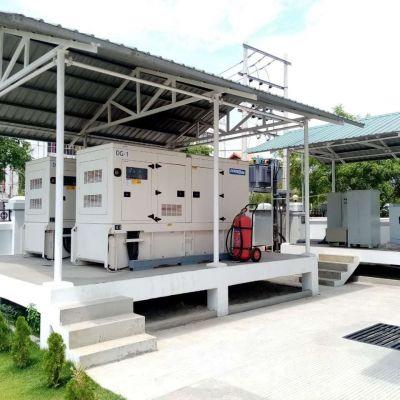A diesel generator is an internal combustion engine that uses diesel to generate electricity. Diesel generators have a variety of uses, from backup power for homes and businesses to portable power for construction sites and recreational vehicles.
Diesel generators are efficient, reliable and durable. They can operate for long periods of time without maintenance and are able to withstand extreme weather conditions.
If you're looking for a reliable power source, a diesel generator is a great choice. In this guide, we explain how diesel generators work and the different types available.
What is a diesel generator?
Diesel generators use diesel fuel to power an alternator to generate electricity. It is reliable backup power, especially in areas where the grid may be unreliable or unavailable.
Diesel generators are commonly used in industries such as construction, mining and healthcare, where a consistent power supply is critical. They are also used for emergency power in hospitals, data centers and other critical facilities where a power outage could result in loss of life or property.
Diesel generators are known for their high energy density, durability and efficiency. They are also cost-effective to operate and maintain compared to other types of generators. They come in a variety of sizes and power outputs, from small portable units for camping or outdoor activities to large industrial-grade generators capable of generating megawatts of power.
How do diesel generators work?
A diesel generator is an internal combustion engine that uses diesel to generate electricity. They are often used as backup power in the event of a power outage, or as primary power in areas without access to the grid.
The working principle of a diesel generator is to convert the chemical energy in diesel fuel into mechanical energy. This mechanical energy is then used to generate electricity by driving a generator. The electricity produced by the generator can then be used to power electrical equipment and appliances.
What are the benefits of using a diesel generator?
When the power goes out, diesel generators can keep your business running. Reliable and efficient, the diesel generator can run for a long time without refueling. They are also relatively easy to maintain and can be used in a variety of applications.
There are many benefits to using a diesel generator, but some of the most important include:
Reliability: Diesel generators are very reliable and can run for long periods of time without refueling.
Efficiency: Diesel generators are so efficient that they can generate a lot of electricity while using very little fuel.
Maintainability: Diesel generators are relatively easy to maintain and do not require much upkeep and attention.
Are there any downsides to using a diesel generator?
While diesel generators are generally very reliable, there are some potential downsides to using one for your electrical needs. For example, a diesel generator can be very loud. Also, diesel fuel can be expensive, so if you're looking for a more affordable option, a different type of generator might be a better choice. Finally, diesel generators require regular maintenance, so if you're not used to doing basic maintenance, it might not be for you.
Conclusion
A diesel generator is an internal combustion engine that uses diesel fuel to generate electricity. They are generally more efficient than gasoline generators and can run for longer periods of time. If you have any questions about our products, please feel free to contact us at info@powerlinkworld.co.uk.
